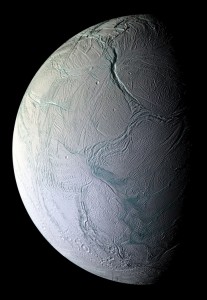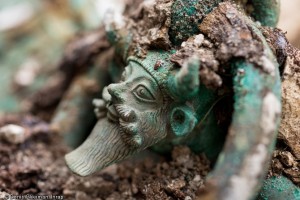The Snow and Ice Moon
Friday, February 21st, 2020February 21, 2020
The month of February is the shortest—normally only 28 days—on the Gregorian calendar. In the Northern Hemisphere, many people may be grateful for that, as February is the typically cold last full month of winter. (In the Southern Hemisphere, February is the last full month of summer.) In parts of North America, some Native Americans referred to this time of year as the “snow moon” because of the month’s heavy snows. Other Native Americans called it the “little famine moon” because of the scarcity of food at the end of winter. The ancient Celts of Europe referred to the frigid time of year as the “ice moon.”

Ancient Celts referred to the February time of year as the “ice moon,” a name that better describes Enceladus, a satellite of Saturn. Enceladus has active geysers that spout water ice. The moon’s icy surface is continually smoothed by this activity and shows few craters. Credit: NASA/JPL/Space Science Institute
According to legend, the first calendar of the ancient Romans had only 10 months. But in about 700 B.C., the ruler Numa Pompilius added January and February. February became the last month of the Roman year. The month takes its name from the Latin word februare, meaning to purify. The Romans purified themselves in February to prepare for festivals at the start of the new year. Later, the Romans moved the beginning of the year from March to January, making February the second month.
February usually had 28 days until the time of the Roman statesman Julius Caesar. Caesar gave it 29 days in standard years and 30 every four years. According to tradition, the Roman emperor Augustus took one day off February to add to August, the month named after him. Today, February has 28 days in standard years and 29 in leap years.
In the United States, February is designated as Black History Month, a time to honor the accomplishments of African Americans and their contributions to society. The third Monday in February was chosen as Presidents’ Day to honor the nearby birthdays of Abraham Lincoln (February 12) and George Washington (February 22). February 2 is recognized in a more whimsical fashion as Groundhog Day.
In Japan, people celebrate a holiday called Setsubun on February 3 or 4. According to the lunar calendar used in the past, this date marks the changing of the seasons and the end of winter. Another holiday in Japan is National Foundation Day, celebrated on February 11. According to tradition, Jimmu founded the imperial dynasty and the empire of Japan on that day in 660 B.C. People in most Western countries celebrate Valentine’s Day on February 14. February 21 is Shaheed Dibash (Martyrs’ Day) in Bangladesh. On this day, people remember those who died during demonstrations that called for the Bengali language to have equal status with the Urdu language in 1952, when Bangladesh was still part of Pakistan.



